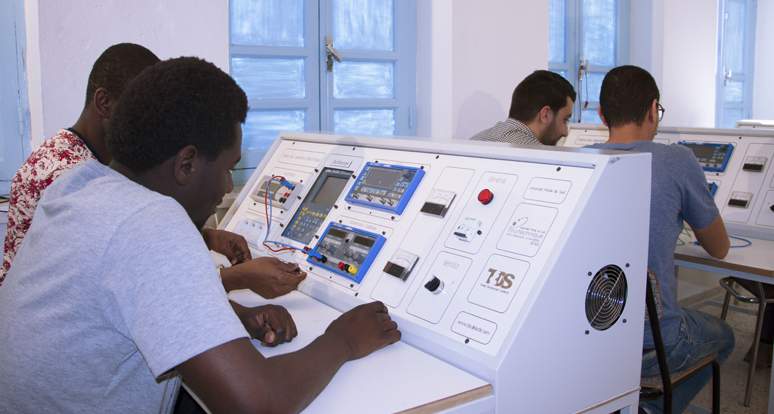
Diplôme national d'ingénieur en automatique et informatique industrielle
- [ssba]
Objectives
Control is a modern science that studies dynamic systems for control or decision-making purposes. The control of industrial processes (management, optimization, planning) must, to be carried out successfully, proceed from a multidisciplinary approach integrating the methods of automation (modeling, identification, control, etc.) and industrial computing. It is a specialty that is multidisciplinary in nature and covers very diverse subjects, because the engineer in Automatic Engineering & Industrial Computing is a man in the field capable of managing information from a production platform, a specialist in the design , the creation, implementation and maintenance of computer systems and applications in the industrial and production sector, this is why IPSAS has set itself the objective of training engineers in this field, having knowledge and skills extended to all the disciplinary sectors of this field.
Opportunities
As for outlets, they are numerous, both in large companies and in SMEs and SMIs and concern many very varied sectors of activity: the electrical and electronic industries, production, transport, health, agri-food, aeronautics. In addition, the engineer has the possibility of pursuing post-graduate studies in Masters and Doctorates, in Tunisia or abroad.
Program plan
Module de la 1ére année
-
Matière 1.1:Signals and systems
-
Matière 1.2:Analysis and Dynamic Systems
-
Matière 1.3:Commands of Continuous Linear Systems
-
Matière 1.4:Modeling and control of industrial processes
-
Matière 1.5:Basic Electronics
-
Matière 1.6:Physics of electronic components
-
Matière 1.7:Active component electronics
-
Matière 1.8:Digital electronics
-
Matière 1.9:Electrical engineering
-
Matière 1.10:Electric machine
-
Matière 1.11:Electrical Diagrams and Technology
-
Matière 1.12:Programmable Logic Controllers
-
Matière 1.13:Computer architecture
-
Matière 1.14:Programming languages
-
Matière 1.15:Sensors and Actuators
-
Matière 1.16:Logic systems and circuits
-
Matière 1.17:Grafcet
-
Matière 1.18:Process automation techniques
-
Matière 1.19:Pneumatic and hydraulic automation
-
Matière 1.20:Optimization
-
Matière 1.21:Transversal materials
Module de la 2éme année
-
Matière 2.1:Analysis and control of discrete systems
-
Matière 2.2:Industrial regulation
-
Matière 2.3:Automatique
-
Matière 2.4:Analog and modular electronics
-
Matière 2.5:Acquisition and conversion techniques
-
Matière 2.6:Electronic Workshop
-
Matière 2.7:Electric machine
-
Matière 2.8:Power electronics
-
Matière 2.9:Microprocessors, Microcontrollers and DSPs
-
Matière 2.10:Computer Workshop
-
Matière 2.11:Discrete event systems
-
Matière 2.12:Industrial automation
-
Matière 2.13:Analysis and control of nonlinear systems
-
Matière 2.14:Analysis and code of non-stationary systems
-
Matière 2.15:Analysis and control of systems in state space
-
Matière 2.16:Identifying systems
-
Matière 2.17:Industrial process control technology
-
Matière 2.18:Digital correctors and regulators
-
Matière 2.19:Automatic CAD and Automation
-
Matière 2.20:Internet and Multimedia Technology
-
Matière 2.21:Smart Sensors and Industrial Instrumentation
-
Matière 2.22:Management and economy
-
Matière 2.23:English II
-
Matière 2.24:Mini-project
Module de la 3éme année
-
Matière 3.1:Parametric and state estimation
-
Matière 3.2:Identification and Analysis of Complex Systems
-
Matière 3.3:Optimal and robust control
-
Matière 3.4:Adaptive and predictive control
-
Matière 3.5:Communications interface
-
Matière 3.6:Real-time systems and computer networks
-
Matière 3.7:Technological management of industrial projects
-
Matière 3.8:Advanced Architecture and Technology
-
Matière 3.9:Perception and vision system
-
Matière 3.10:Automatic System Control Technique
-
Matière 3.11:Computerized control of industrial processes
-
Matière 3.12:Evolutionary optimization algorithms
-
Matière 3.13:Expert and supervised control
-
Matière 3.14:Fuzzy and neural controls
-
Matière 3.15:Intelligent Control Technique

